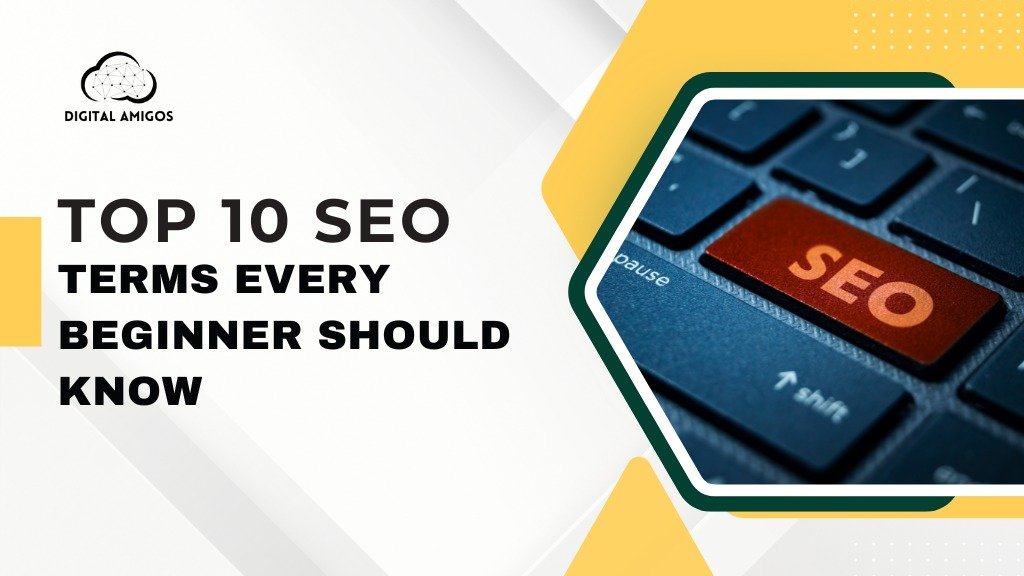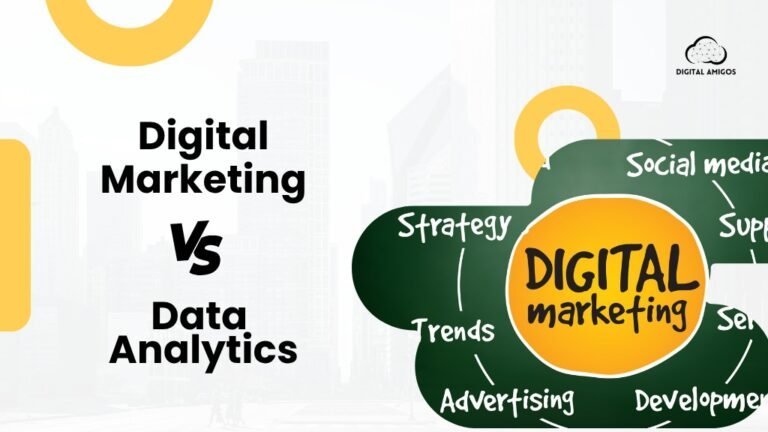Top 10 SEO Terms Every Beginner Should Know
Are you trying to learn SEO but confused by technical terms like SERP, backlinks, and meta tags? Don’t worry — you’re not alone.
When you’re just starting with SEO, the biggest roadblock isn’t strategy — it’s understanding the language of SEO. This blog will help you learn the top 10 SEO terms that every beginner should know — explained in simple, everyday language, with examples.
Whether you’re a blogger, small business owner, or digital marketing student, these basic SEO terms will give you a strong foundation.
1. SEO (Search Engine Optimization)
Let’s start with the most important one — SEO itself.
What it means:
SEO stands for Search Engine Optimization — the process of improving your website so that it ranks higher on Google and other search engines.
Key Components of SEO:
- Technical SEO: Making sure your site loads fast and is easy for Google to crawl.
- On-Page SEO: Optimizing your website content, titles, images, and structure.
- Off-Page SEO: Building your authority through backlinks and social proof.
Why it matters:
Better SEO = higher rankings = more visibility = free (organic) traffic.
Example:
If someone searches “best street food in Delhi” and your blog appears on the first page, that’s the power of SEO.
2. Keywords
What it means:
A keyword is the phrase or word that people type into Google when they want something.
Why it matters:
Using the right keywords helps search engines understand your content and show it to the right people.
Types of keywords:
- Short-tail keywords (broad): e.g. digital marketing
- Long-tail keywords (specific): e.g. digital marketing tips for small businesses in India
Tools to Find Keywords:
- Google Keyword Planner
- Ubersuggest
- SEMrush / Ahrefs
- AnswerThePublic
Example:
If your page talks about “best budget phones under ₹10,000,” use those exact keywords naturally in your blog or product page.
3. SERP (Search Engine Results Page)
What it means:
SERP stands for Search Engine Results Page — the list of web pages shown when someone performs a search.
Why it matters:
Getting your page on the first page of the SERP (especially in the top 3) means more visitors and more clicks.
What Appears in a SERP:
- Paid Ads (usually at the top)
- Organic Results (non-paid)
- Featured Snippets (Google’s short answer box)
- Knowledge Panels (on the right side)
- Local Map Pack (for local searches)
Example:
Search “digital marketing agency near me” — what you see is the SERP.
4. Meta Title and Meta Description
What it means:
These are invisible to users on your website, but they appear in Google’s search results.
Meta Title:
- The blue clickable link in search results.
- Should include your main keyword.
- Around 60 characters for best results.
Meta Description:
- Short summary under the title.
- Describes what your page is about.
- Up to 160 characters.
Why it matters:
A good title and description improve click-through rate (CTR) — more people click your link.
Example:
Meta Title: “Top 10 SEO Tips for Beginners – Easy Guide”
Meta Description: “Learn SEO easily with these beginner-friendly tips. Simple language, real examples, and expert advice.”
5. Backlinks
What it means:
A backlink is when another website links to your site. Google sees this as a sign of credibility and trust.
Types of Backlinks:
- Dofollow: Passes SEO value (“link juice”)
- Nofollow: Doesn’t pass SEO value but can bring traffic
Why it matters:
Google sees backlinks as “votes of trust.” More quality backlinks = higher rankings.
Real Example: If NDTV mentions your website in an article and links to it — that’s a strong backlink.
Tip:
Backlinks from spammy or unrelated sites can hurt your SEO. Quality > Quantity.
6. On-Page SEO
What it means:
On-page SEO refers to everything you do on your website to help search engines understand your content and to improve search rankings.
Key On-Page SEO Elements:
- Page titles and headings (H1, H2)
- Keyword usage
- Image optimization (alt text)
- URL structure
- Internal linking (linking to your own pages)
Why It Matters:
Google can’t “see” a page like a human. On-page SEO helps Google read, interpret, and rank your page.
Example: A blog post titled “Best Budget Laptops in 2025” should include keywords like “affordable laptops,” “under ₹40,000,” “laptop reviews,” etc.
7. Off-Page SEO
What it means:
Off-page SEO includes all activities done outside your website to improve rankings.
Key Off-Page SEO Activities:
- Building backlinks
- Social media shares
- Brand mentions
- Forum participation (Quora, Reddit)
- Guest blogging
Why It Matters:
Off-page SEO builds your authority, trust, and credibility in Google’s eyes.
Example: Someone writes a blog about “Best Digital Agencies in India” and includes a link to your company — that boosts your off-page SEO.
8. Technical SEO
What it means:
Technical SEO is about improving the backend of your website so search engines can crawl and index it properly.
Key Technical SEO Elements:
- Site speed
- Mobile responsiveness
- SSL (HTTPS)
- Structured data (schema)
- Crawl errors
- XML sitemap
- Robots.txt file
Why It Matters:
If your site loads slowly, isn’t mobile-friendly, or has broken links — Google may rank you lower even if your content is excellent.
Example: A site that loads in under 2 seconds on mobile devices is far more likely to rank well than one that takes 6+ seconds.
9. Domain Authority (DA)
What it means:
Domain Authority is a score (out of 100) that predicts how well a website can rank on search engines.
Why it matters:
- The higher your DA, the more likely you’ll rank well.
- DA is based on the quality and quantity of your backlinks.
Note:
It’s not an official Google metric, but created by tools like Moz.
Example:
If your DA is 15 and your competitor’s is 40, they may outrank you unless your content is better optimized.
10. Organic Traffic
What it means:
Organic traffic is the number of visitors who come to your website from search results, without clicking on paid ads.
Why it matters:
- Organic traffic is long-term, cost-effective, and usually brings better-quality leads.
- It grows over time with proper SEO.
- Visitors from organic search are usually high-intent (serious readers, buyers).
Bonus SEO Terms You Should Know
- Anchor Text – The clickable text in a link (e.g., “click here”)
- Bounce Rate – Percent of people who leave your site without doing anything
- Canonical Tag – Tells Google which version of a page to index if you have duplicates
- Alt Text – Describes an image — helps SEO and screen readers
- Sitemap – A file that lists all pages on your website for Google to crawl
Conclusion: Learn the Language of Google
You don’t need to become an SEO expert overnight. But by understanding these 10 essential SEO terms, you’ve already taken a giant step forward.
Here’s what to remember:
- Keywords and content are your foundation.
- Backlinks and authority build trust.
- On-page and technical SEO help Google understand your site.
- Ranking well brings free, consistent organic traffic.
✅ Start with simple SEO, stay consistent, and your website will grow naturally over time.
1. What is the easiest way to learn SEO terms as a beginner?
Start with simple blogs like this one that explain SEO terms in plain language. You can also watch YouTube tutorials focused on SEO basics, use free resources like Google’s Search Central, and most importantly, practice by creating your own blog or website. Applying what you learn in real-time helps reinforce the terms. Over time, these concepts will start to feel natural as you see how they’re used in actual SEO tasks.
2. How many SEO terms do I really need to know to start ranking?
To get started, you don’t need to memorize everything. Just knowing around 10 to 15 basic SEO terms is enough.
Focus on key concepts like keywords, on-page SEO, backlinks, meta title and description, and organic traffic. Once you’re comfortable with these, you can gradually explore more advanced terms like schema markup, crawl budget, or canonical tags.
3. Are all SEO terms technical or difficult to understand?
Not at all. While some SEO terms may sound technical at first, most of them are quite easy to understand when explained with examples. For instance, a “backlink” simply means a link from another website to yours. The “meta title” is the clickable title that appears on Google search results. This blog breaks down such terms in beginner-friendly language, so even if you don’t have a tech background, you can still grasp the concepts.
4. What are the most important SEO terms to focus on as a small business owner?
As a small business owner, you should focus on SEO terms that can directly improve your local visibility and drive traffic. These include local SEO (which helps your business appear in nearby searches), keywords (especially the ones your target customers are searching for), meta title and description (to make your Google listing more appealing), backlinks (to build trust through relevant site links), and mobile optimization (so your site works well on smartphones). These basics can boost your online presence without requiring a big investment.
5. Do SEO terms change over time?
Yes, SEO terms do evolve, especially as Google updates its algorithms. While foundational terms like keywords, backlinks, and SERP remain essential, new terms have emerged over the years. For example, Core Web Vitals (introduced in 2021), E-E-A-T (Experience, Expertise, Authority, Trust), and passage indexing are newer concepts. Staying updated through trusted industry blogs like Moz, Search Engine Journal, or Neil Patel’s site can help you keep pace with the latest SEO trends.








